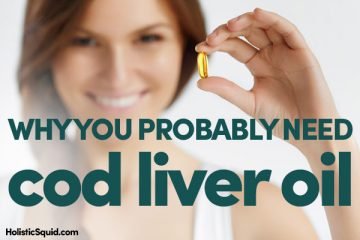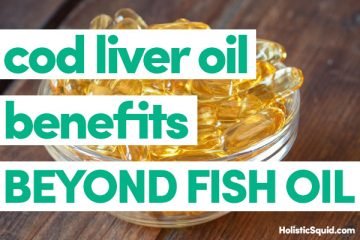

Do I have a kids multivitamin that I love? Not so much. I'm a big believer in serving nutrition on a plate – not in a pill. That said, there are a handful of kids supplements that should be in regular rotation.
These three kids supplements will only do a body good. This is true for kids struggling with eczema, allergies, and mood swings. And it's true for kids that are already teeming with energy and vibrant health.
Three kids supplements for every small human
Even if your kid eats a “healthy” diet and spends plenty of time outdoors in the sunshine, chances are good that vitamin D requirements aren't being met. There's also widespread exposure to drugs and chemicals that put a strain on digestive health.
So, small amounts of seafood (if any) along with lots of seed and nut oils, time spent indoors, and modern conveniences filled with drugs and chemicals. This is your reality. And when it comes to nourishing young bodies – it's not ideal.
Fortunately, you can supplement. And if you have ever wondered which kids supplements are most important, here's a short and sweet list that touches on what kids really need.
#1 – Fish oil
Kids and adults alike thrive with an abundance of long-chain omega-3s. For children, this need is especially important, considering these special fats support brain development.
In short, your child's diet should be filled with lots of long-chain omega-3s relative to omega-6 fatty acids – which are found in grains, nuts, seeds, and common cooking oils. The problem? Most kids aren't eating foods that are high omega-3s. But they are eating plenty of grains, nuts, seeds, and vegetable oils.
Examples of long-chain omega-3 fats are DHA (docosahexaenoic acid) and EPA (eicosapentaenoic acid). These omega-3s are found mostly in seafood. You can also get small amounts of DHA from:
- Eggs
- Organ meats
- Fat of well-raised animals
Besides the role they play in brain development, long-chain omega-3 fats are vital for healthy eyesight. They also safeguard against inflammation, which means they play a role in how your child's immune system works.
BEWARE: If you offer your child flaxseed oil as a source of omega-3s, there's good reason to reconsider. The omega-3s from plants like flaxseed must be converted into a usable long-chain form. Not only is conversion poor – but depending on genetic makeup, your child might have a very difficult time pulling brain-important DHA from short-chain plant oils.
Kids should receive between .7 and 1.6 grams of omega-3s each day, depending on their age. Unless they’re eating a 3 ounce filet of salmon every single day, it can be hard for them to get enough through diet alone.
You can find my favorite fish oil here.
#2 – Probiotics
Probiotics support your kid's immune system, digestion, and brain development. Issues like ADHD, autism, eczema, allergies, and asthma all have a reputation for being linked to an unhealthy gut. And unfortunately, gut imbalances can be traced back to some very common trends, including:
- Antibiotic use
- Formula use – instead of breast milk
- Refined, processed foods
While some foods – like yogurt – are marketed for their probiotic power, pay close attention to the ingredients. Oftentimes, you'll find plenty of added sugar. Sometimes, there will even be artificial colors and flavors. You're also not likely to find bifidobacteria in most yogurts, which is a probiotic strain that tends to dominate the gut of healthy babies and has been linked to a number of health benefits.
When shopping for a probiotic-rich yogurt, look for one that's unsweetened and organic. Even better, make you own using raw milk.
Besides yogurt, I recommend a high-quality probiotic like this one.
#3 – Vitamin D3
This essential nutrient is necessary for immune system balance, strong bones, a healthy brain, and cancer prevention. With the help of a little sunshine, the body can make enough vitamin D. However, there are plenty of obstacles that put children at risk for vitamin D deficiency.
For starters, many kids spend their days indoors for class and after-school events. They’re simply not getting the recommended amount of sunlight needed for adequate vitamin D levels. Genetic variations can also determine how much bioavailable vitamin D is floating around and free for immediate use.
Besides sunshine, food can be a wonderful source of vitamin D. We're talking BACON.
High-quality bacon and lard from pigs that have spent time outdoors foraging are an excellent source of vitamin D. Carnitas cooked in lard for melt-in-your-mouth perfection or a side of bacon is easy for any kid to love. Other sources of vitamin D comes from a spectrum of seafood, including:
- Wild salmon
- Sardines
- Mackerel
- Oysters
- Fish roe
In addition to seafood, you can find vitamin D in a high-quality cod liver oil, like this one. To make cod liver oil kid-friendly, mix it with a little fruit juice.
In order to really know your child's vitamin D levels, you might want to use this home test kit. Then choose a kids supplement for vitamin D3 and follow these steps:
- Start with 35 IU per pound of body weight. That’s approximately 1,000 IU for healthy children under the age of 2. 2,000 IU for children over the age of 2. And 5,000 IU for an average sized adult or adolescent per day.
- After 2 months of taking the recommended dosage, check your vitamin D levels again.
- Adjust your dose and retest as needed. Adequate vitamin D levels fall between 50-80 ng/ml.
For kids and adults alike, I like these liquid vitamin D3 drops.
Do you give your kids supplements?
Let me know in the comments below!










Hi, Thanks for a good post!
I give my two (1 and 4 yrs old) children some high quality omega-3 and some probiotics in the morning. The 4 year old also gets half the daily dose of a multivitamin/day, made only out of organic herbs, and the 1 year old gets extra D-vitamin.
In the winter they both get a really nice mixture of fermented herbs before every meal to gently support their immune system against colds amd coughs, as kindergarten are packed with runny noses!
But yea, it is absolutely the homegrown/local organic and biodynamic real food, lots of outdoor play and fresh air – both in our home and in our wonderful organic Waldorf kindergarten, that makes their small bodies grow strong and healthy!
Regards – Louise (Denmark)
Hi Louise!
Thank you for sharing about the herbs! Can you share which herbs and how you ferment them? I have a 1.5 year old and I’m always looking for better ways to bolster her immunity.
Hi Emily! Thanks for such an informative article! I’m curious about dosage info for the cod liver oil. We have been using Rosita EVCLO for about a year now for myself and kids who are 7 & under. I know it definitely depends on individual needs, but do you have a dosage recommendation? I’ve been doing 1tsp for myself, 1/2t for my 5 & 7yos and 1/4t for my 2 & 3yos. I haven’t been able to find a definitive answer anywhere! Thanks!!
Hey Stephanie,
It depends on your family’s diet. CLO is a good source of vitamin A. If you regularly eat liver, I think the doses you listed work. But if liver isn’t a regular (like weekly) food in your home, you can give your little ones as much as 1/2 teaspoon a day and you older kids a full teaspoon.
Of course, CLO doesn’t cover all your bases — it’s still important to focus on fatty fish, seafood, and lard from well-raised pigs 😉
Emily xoxo
Great list! I would add vitamin K2 to the list and liposomal vitamin C. Thanks, Becs 🙂
Which k2 do you use for children?
All great supplements important for kids nowadays
I have a 3 month old little guy. He weighs about 12 lbs. now. We have been giving him fish oil containing 300 iu per dose and vit d 400 iu. Just concerned if that’s to much to little? Would love some guidance!
Thank
You!
Hey Jill,
If you’re formula feeding, this sounds just fine. However, if you are breastfeeding – there’s no need to give him any supplements unless guided to by your pediatrician. As long as you take 600 IU of vitamin D a day, your breast milk will give him his daily requirement of vitamin D.
All the best!
Emily xoxo
I’ve been told that a breastfeeding mother needs at least 6400 iu to pass enough to a nursing baby.
hello, Any recommendations of the brands you use?
Where do I purchase these and do I purchase each separate?
Hi Vane, my recommendations for these products are all in the article above. I purchase most of my supplements via Amazon as it’s just easier for me. However, if that’s not an option for you, your local health store should have some good alternatives. xoxo Emily
What are your thoughts on daily kid friendly + organic Elderberry syrup for immune support? Thanks!